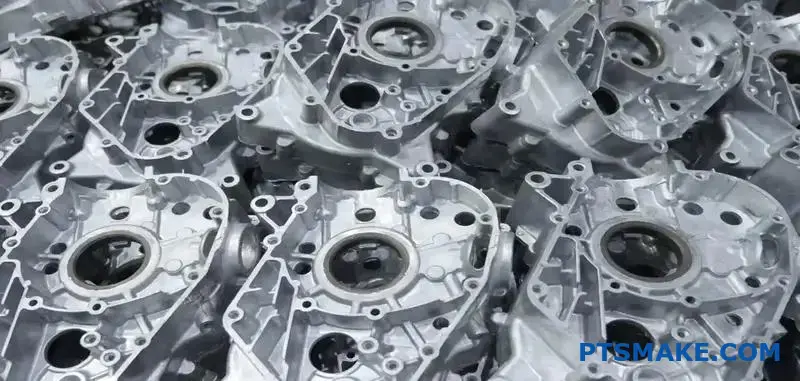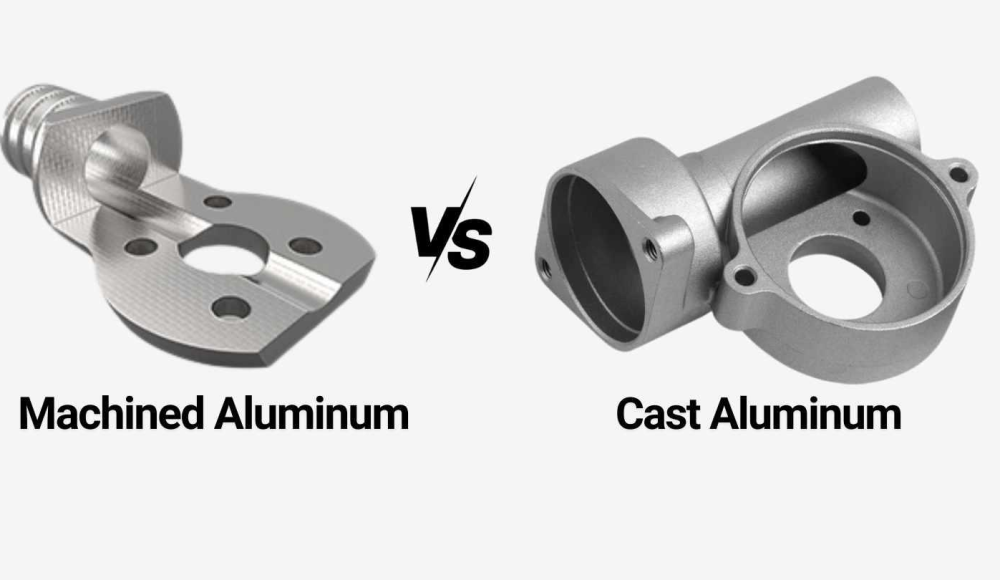The Future of Light Weight Aluminum Foundries: Advancements and trends Shaping the Industry
The aluminum shop sector is undertaking substantial transformation. Trick fads highlight the relevance of sustainability and effectiveness. Technologies in smart production and automation are becoming common. Factories are significantly concentrated on utilizing recycled products. This change elevates questions about future techniques and innovations. Exactly how will these changes impact production techniques and market dynamics? The solutions may redefine the industry landscape in unanticipated ways.
Developments in Smart Production Technologies
As the aluminum shop industry progresses, innovations in smart production innovations are becoming progressively important for enhancing productivity and performance. The combination of automation, expert system, and the Internet of Things (IoT) is transforming standard foundry operations. These modern technologies allow real-time surveillance of procedures, permitting prompt changes that optimize outcome and minimize waste.
Equipment knowing formulas assess production information to identify patterns and anticipate maintenance needs, decreasing downtime. Robotics are progressively used for repetitive jobs, releasing competent workers to concentrate on more complex difficulties. In addition, electronic doubles-- virtual models of physical processes-- facilitate simulations that can enhance design and operational strategies.
The adoption of these wise production technologies is driving competitive benefits in the aluminum shop sector. By simplifying operations and improving decision-making capabilities, shops can fulfill growing market needs while keeping high-quality standards. The future of light weight aluminum foundries is unquestionably connected to these technological developments.
Embracing Eco-Friendly Materials and Processes
The aluminum factory sector is increasingly concentrating on green products and procedures to enhance sustainability. This change consists of the fostering of lasting product sourcing, energy-efficient production methods, and reliable recycling and waste administration approaches. By integrating these techniques, shops intend to lower their environmental effect while maintaining competitiveness in the market.
Sustainable Material Sourcing
How can light weight aluminum shops improve their sustainability efforts? Lasting product sourcing has actually emerged as a vital strategy in achieving this goal. By prioritizing recycled aluminum, factories can considerably lower their ecological impact, as recycled materials require much less power and less resources contrasted to main aluminum manufacturing. Additionally, sourcing materials from licensed providers who abide by environment-friendly practices advertises accountable mining and reduces environmental impact. Factories are also checking out alternate materials, such as biopolymers and environmentally friendly coatings, to enhance conventional aluminum procedures. Collaborating with stakeholders, consisting of vendors and ecological companies, cultivates innovation in sourcing approaches. Inevitably, accepting lasting product sourcing not only aligns with global sustainability objectives however also settings aluminum shops as leaders in environmentally liable production.
Energy-Efficient Production Methods
Aluminum shops are significantly embracing energy-efficient manufacturing methods to complement their lasting material sourcing efforts. These methods focus on reducing energy consumption throughout the manufacturing process. Advanced modern technologies, such as induction melting and optimized casting processes, are being implemented to reduce the total carbon footprint. Furthermore, automation and wise production systems enhance functional efficiency, allowing for much better power management. Factories are also discovering the integration of renewable resource resources, such as solar and wind, to power their procedures. By prioritizing power efficiency, light weight aluminum factories not just lower manufacturing costs yet additionally straighten themselves with international sustainability goals, making certain a more eco responsible strategy to aluminum production while satisfying the increasing demand for environment-friendly practices in the market.
Recycling and Waste Administration
Embracing environmentally friendly products and procedures, light weight aluminum foundries are prioritizing recycling and waste monitoring strategies to enhance sustainability in their operations. By incorporating closed-loop systems, these centers are minimizing waste and optimizing resource effectiveness. Scrap aluminum, a readily available product, is being recycled on-site, greatly lowering the requirement for virgin materials and reducing power consumption. Technologies in sorting and processing innovations additionally assist in the recycling of aluminum, making certain that also contaminated products can be repurposed effectively. Additionally, foundries are taking on lasting methods such as lowering harmful waste and advertising the use of biodegradable materials for packaging. This dedication to reusing not only lowers ecological impact however also boosts the financial practicality of light weight aluminum foundries in an open market.
The Function of Automation and Robotics
Automation and robotics are significantly changing the aluminum shop sector, considerably boosting production performance. By incorporating advanced innovations, foundries can lower labor expenses while simultaneously boosting safety requirements for their labor force. This shift not just enhances procedures yet additionally positions the market for sustainable development in an affordable market.
Improved Production Effectiveness
Transforming production processes, the integration of innovative robotics and automation technologies has actually come to be a keystone for light weight aluminum shops looking for boosted effectiveness. These advancements streamline workflows, reduce cycle times, and improve product high quality by reducing human error. Automated systems can keep an eye on manufacturing lines in real-time, enabling prompt adjustments that optimize outcome. In addition, robotics facilitate the click here for more handling of harmful products, making certain much safer workplace while increasing throughput. Anticipating maintenance innovations also contribute to effectiveness by anticipating equipment failings, therefore lowering downtime. As an outcome, aluminum factories can accomplish greater consistency in their products while responding much more swiftly to market needs. This welcome of automation is setting a new requirement for productivity and operational excellence within the sector.

Lowering Labor Costs
The change in the direction of progressed robotics and automation in aluminum factories not only enhances production effectiveness yet also plays a considerable function in decreasing labor costs. By integrating automated systems, factories can lessen the dependence on hand-operated labor, which commonly entails high salaries and training expenditures. Robotics streamline repeated tasks such as putting, molding, and ending up, enabling a greater result with fewer personnel. This technical change not only reduces labor-related costs yet likewise enhances consistency and high quality in production. In addition, automation can run around the clock, making best use of operational hours without the linked costs of overtime or change differentials. As an outcome, aluminum shops can attain significant cost savings while maintaining competitive pricing in a progressing market landscape.
Improving Safety And Security Standards
While standard light weight aluminum foundry operations frequently reveal workers to dangerous environments, the integration of robotics and automation substantially enhances safety requirements within the market. Automated systems can execute risky tasks, such as liquified metal handling and heavy training, decreasing human direct exposure to unsafe conditions. Additionally, robotics can run in extreme temperatures and harmful environments, properly minimizing the threat of injury. Advanced checking innovations and expert system guarantee real-time safety evaluations, enabling for instant actions to possible dangers. Automation enhances operations, reducing the possibility of crashes caused by human error. Consequently, the fostering of these technologies not only enhances safety and security however additionally fosters a more productive and reliable workplace in light weight aluminum factories.
Enhancing Power Performance in Production
As light weight aluminum foundries seek to keep competition in an evolving market, boosting power effectiveness in manufacturing has arised as a vital focus. By embracing advanced innovations such as high-efficiency melting heaters and automated temperature level controls, factories can notably reduce power usage. Executing real-time monitoring systems enables exact tracking of power use throughout the production procedure, making it possible for quick adjustments to maximize performance.
In addition, moving to different power sources, including eco-friendly choices, can further reduce the carbon impact. The assimilation of power recuperation systems, which reclaim waste heat for reuse, is coming to be increasingly usual. Training employees in power useful content management techniques guarantees that everybody associated with the production process bears in mind energy usage.
These initiatives not only lower functional prices however likewise align with international sustainability goals, placing aluminum foundries as liable players in the industry while enhancing their general competition. - Precision aluminum casting
Developments in Recycling Light Weight Aluminum
Advancements in recycling aluminum have actually gained momentum alongside initiatives to enhance energy effectiveness in production. The aluminum market has actually welcomed sophisticated modern technologies that improve the reusing procedure, lowering power consumption and ecological effect. Methods such as hydrometallurgy and brand-new sorting technologies boost the extraction of aluminum from scrap, boosting return prices and making certain greater high quality recycled material.
The advancement of closed-loop recycling systems enables factories to reuse light weight aluminum without considerable deterioration in quality, making the process more sustainable. Technologies in logistics and collection, including boosted monitoring systems and automated sorting, have likewise played a necessary function in enhancing the efficiency of aluminum recuperation. These advancements not only add to a round economy but likewise help mitigate the carbon impact related to light weight aluminum production. As the need for sustainable practices expands, these technologies position the aluminum factory field as a leader in liable source management.
Reacting To Market Needs and Customer Trends
Adaptability has actually become a cornerstone for light weight aluminum factories reacting to advancing market demands and customer patterns. As industries increasingly prioritize sustainability, aluminum shops are shifting towards green practices, including enhanced reusing processes and decreased carbon impacts. This shift lines up with customer choices for environmentally liable products, driving factories to innovate their offerings.
Furthermore, the increase of light-weight products in vehicle and aerospace fields requires improvements in aluminum alloys and casting techniques. Factories are spending in r & d to generate high-strength, lightweight elements that fulfill rigid efficiency standards.
Personalization has actually gotten grip, with consumers seeking customized options. Light weight aluminum foundries are leveraging innovative production modern technologies, such as 3D printing, to suit specific client demands effectively. This responsiveness not just satisfies customer demands yet additionally placements aluminum foundries competitively in a vibrant market landscape, ensuring their significance in an ever-changing industrial environment.

Often Asked Concerns
How Do Aluminum Foundries Impact Local Economies?
Light weight aluminum foundries significantly influence neighborhood economic situations by producing tasks, boosting need for local vendors, and adding to neighborhood advancement. Their operations commonly lead to enhanced tax earnings, which can money important public services and infrastructure enhancements.
What Are the Safety And Security Regulations for Light Weight Aluminum Shop Workers?
Security policies for light weight aluminum foundry workers include mandatory individual safety equipment, correct ventilation systems, routine training on Get More Info hazardous products, and adherence to guidelines set by occupational health and wellness and security administrations to reduce threats and assurance worker security. - aluminum casting
Exactly How Does Aluminum Recycling Affect Global Supply Chains?
Light weight aluminum recycling considerably lowers need for raw materials, improves resource effectiveness, and maintains costs. This shift effects worldwide supply chains by promoting a round economic climate, promoting sustainability, and ensuring a more resistant sector in varying markets.
What Occupation Opportunities Exist in the Aluminum Factory Industry?
Different career chances exist in the light weight aluminum foundry sector, consisting of duties in design, high quality control, production administration, and r & d. Proficient labor settings such as mold and mildew manufacturers and maker operators are likewise sought after.
Just How Do International Trade Plans Impact Aluminum Foundries?
International trade plans significantly affect aluminum foundries by impacting import tolls, supply chain characteristics, and market accessibility. These aspects can affect functional costs, competitiveness, and overall earnings within the worldwide light weight aluminum production landscape.
By prioritizing recycled aluminum, shops can greatly minimize their ecological footprint, as recycled materials need much less energy and less sources contrasted to key aluminum production. Light weight aluminum factories are progressively taking on energy-efficient manufacturing techniques to complement their lasting material sourcing initiatives. Automation and robotics are progressively changing the light weight aluminum factory market, substantially enhancing production performance. The shift in the direction of advanced robotics and automation in light weight aluminum shops not only improves production performance but likewise plays a significant function in minimizing labor prices. As light weight aluminum shops look for to keep competitiveness in a developing market, improving power performance in production has actually arised as an essential emphasis.